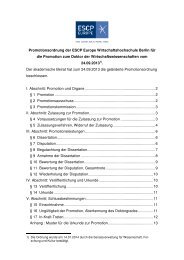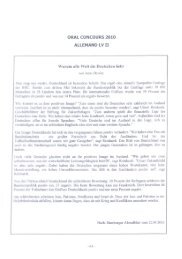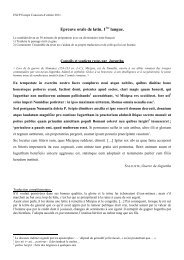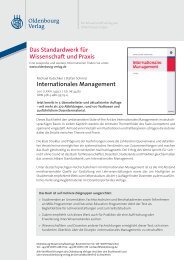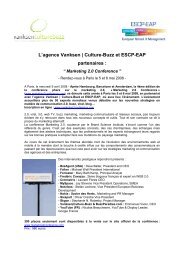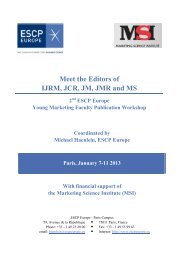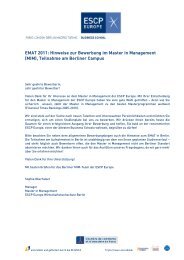CCAB Report Sept 2010 V5_edited - ESCP Europe
CCAB Report Sept 2010 V5_edited - ESCP Europe
CCAB Report Sept 2010 V5_edited - ESCP Europe
Create successful ePaper yourself
Turn your PDF publications into a flip-book with our unique Google optimized e-Paper software.
Towards a framework of mandatory<br />
sustainability disclosure by publicly<br />
listed companies<br />
Dr Davide Sola<br />
Emmanuel Jouanne<br />
Lucie Roux<br />
Raluca Gheorghita<br />
London, <strong>Sept</strong>ember <strong>2010</strong><br />
1
Acknowledgment<br />
We were granted remarkable access to top officials in more than twenty companies and<br />
institutions. We are profoundly grateful for the time environmental professionals, sustainability<br />
division heads, board Members spent with us. In total we spoke with 22 people from various<br />
institutions and UK corporate companies. These persons took the time to share with us the<br />
environmental challenges businesses have to overcome. For reason of confidentiality, the<br />
interviewees’ names are not mentioned in this report. For the same reason, the authors of the<br />
quotes, as well as the companies they belong to, are not mentioned in the body of the report.<br />
We would like to thank the following 15 corporations, audits and institutions:<br />
M&S, Unilever, Kingfisher, Castorama, Co-Operative, Premier Food Plc, Sab Miller, HSBC, GSK,<br />
John Laig Plc, Rexam, Grayling, Christie’s, RM, Rio Tinto, PWC, Deloitte, Accounting for<br />
Sustainability, FEE (Federation des Experts Comptables <strong>Europe</strong>ens), Climate disclosure<br />
Stanadard Board, World Wildlife Fund, Environment Agency<br />
Grayling<br />
We also want to thank Roger Adams, Richard Spencer, Sharon Grant as well as the ICAEW and<br />
the <strong>CCAB</strong> team who supported us at different stages of the project and provided us with<br />
fundamental contacts and invaluable inputs.<br />
2
CONTENT<br />
I. EXECUTIVE SUMMARY ...................................................................................4<br />
II. METHODOLOGY AND APPROACH ...............................................................8<br />
III. TODAY’S DISCLOSURES ON SUSTAINABILITY IN ANNUAL REPORTS 11<br />
IV. THE PRIORITY AREA IS THE ENVIRONMENT ..........................................14<br />
V. LANDFILL WASTE, BIODIVERSITY AND EMPLOYEES ARE ALSO HOT<br />
TOPICS ..............................................................................................................19<br />
VI. AMONG THE KEY TRENDS IS THE FOCUS ON SUPPLY CHAIN.............20<br />
VII. THE IMPACT OF THE STAKEHOLDERS ON THE REPORTING ..............22<br />
VIII. HURDLES: MOST COMPANIES ARE CONFUSED WHEN REPORTING<br />
ON SUSTAINABILITY........................................................................................26<br />
IX. DIFFERENT INDUSTRIES REPORT ON DIFFERENT AREAS ...................33<br />
XI. CONCLUSIONS AND RECOMMENDATIONS .............................................37<br />
XII. REFERENCES.............................................................................................42<br />
XIII. <strong>ESCP</strong> EUROPE TEAM ...............................................................................46<br />
3
I. Executive Summary<br />
Sustainability reporting has become mainstream, driven by the regulations and by the<br />
potential business value generated through enhanced stakeholder reporting and<br />
communication. This report provides some inputs on this important and developing issue.<br />
The pressure on sustainability reporting in the Annual <strong>Report</strong>s has increased over the past<br />
decade but despite the presence of generally accepted guidance such as the Global <strong>Report</strong>ing<br />
Initiative, the sustainability part in the Annual reports lacks coherence and comparability. Despite<br />
the pressure to develop institutional guidance for the disclosure of specific sustainability<br />
information within the Annual <strong>Report</strong>s (sustainability information in the Annual <strong>Report</strong>s is now<br />
required for the Business Review), effective guidance is still lacking.<br />
Moreover, there is no single, universally accepted definition of sustainability reporting. The Global<br />
<strong>Report</strong>ing Initiative Sustainability <strong>Report</strong>ing Guidelines (GRI guidelines) defines sustainability<br />
reporting as “…the practice of measuring, disclosing and being accountable to internal and<br />
external stakeholders for organizational performance towards the goal of sustainable<br />
development”.<br />
This research on sustainability accounting that has started in April <strong>2010</strong> covers mandatory and<br />
voluntary disclosures by publicly listed companies in the UK. It sets out compliance to current<br />
institutional regulations, current practice and innovative activity on the part of businesses,<br />
forthcoming requirement and trends that may end up being incorporated into mandatory<br />
reporting. It also identifies issues around the mandatory disclosure of sustainability information to<br />
take in account for the improvement of the guidance. Six main conclusions have been drawn from<br />
this research:<br />
1) Today there are no mandatory disclosures in the UK in Annual <strong>Report</strong>s<br />
There are no official mandatory disclosures on sustainability in the Annual <strong>Report</strong>s<br />
nowadays in the UK however, according to the Company Act 2006 and the Corporate<br />
Governance Code, companies are required to report on sustainability in their Business<br />
Review. For instance, companies consuming more than 6,000 MWh of energy are<br />
required to report their energy efficiency to the government but it is not mandatory to<br />
report within the Annual <strong>Report</strong>s. Moreover, some FTSE100 companies conducting<br />
activities abroad are required to comply with foreign constraints as they may have to<br />
respect the local regulations. This has an impact on the way the companies report on<br />
4
sustainability. More specific to the industry constraint, some companies in the chemical<br />
industry are required to disclose material issues.<br />
The topic of mandatory disclosures is a matter of great discussion. Harmonisation of the<br />
sustainability in Annual <strong>Report</strong>s through mandatory disclosures vs. flexibility of reporting<br />
through voluntary disclosures is today’s debate within the regulatory institutions and the<br />
leader companies.<br />
2) The priority area is the environment:<br />
The main trend is related to the environmental issues and particularly to the GHG<br />
emissions. Environmental issues are indeed a priority because of the international<br />
pressure and the urgency of preserving the natural resource at a global level. A particular<br />
example is the GHG emissions that might become a mandatory disclosure in the Annual<br />
<strong>Report</strong>s by 2011-2012 in the UK, despite the resistance from the business side. Some<br />
business leaders consider this prescriptive “one-size-fits-all” legislation not appropriate<br />
and not realistic.<br />
Water use and recycling might become the next probable mandatory disclosures after the<br />
GHG emissions, although there is an opposite argument as water used is a difficult<br />
metric to calculate, so a mandatory disclosure would be difficult to implement.<br />
Other possible future mandatory disclosures on the environmental side are landfill waste<br />
and biodiversity. Among the key environmental trends is the focus on supply chain:<br />
companies understand that the environment impact of their business comes from<br />
upstream (suppliers) and passes downstream (to clients). Within the supply chain, the<br />
scope 1 & 2 are the most disclosed vs scope 3 (indirect impact). It is also interesting to<br />
see that the supply chain efficiency is not only driven by retailer’s brand image concern<br />
anymore, but it also becomes a way to generate energy cost savings.<br />
On the employees’ side, health & safety is also considered as a hot topic.<br />
3) Sustainability disclosures in the Annual <strong>Report</strong>s are mainly driven by the<br />
stakeholders<br />
Stakeholders are the main drivers for a company to decide on which topics to disclose.<br />
Moreover, the style of communication, the way sustainability is disclosed (narratives,<br />
KPIs, etc…) is also influenced by the stakeholders.<br />
Marketing/commercial advantages are the following strong drivers. In fact, reporting on<br />
sustainability is often a marketing tool for the companies who can differentiate<br />
themselves from the competitors with individual methods and innovative activity on<br />
sustainability (funds, advanced environment protection, care about employees, etc.). For<br />
instance, the company studied and interviewed showed a focus on different areas when<br />
reporting on sustainability: some consider sustainability as a preservation of human and<br />
5
environmental resources, some assimilate it into ethics, and some see sustainability as<br />
sustainable business (=long term profit). Usually companies care about what are their<br />
competitors’ practices regarding sustainability<br />
The economical advantage is another driver. When companies manage to tie sustainable<br />
KPIs to financial KPIs, they realise that reporting on sustainability can bring benefits.<br />
<strong>Report</strong>ing on sustainability becomes a more and more strategic activity. A consequence<br />
of this differentiation is that each company has established its own framework to report<br />
on sustainability. Most companies rely on the GRI guidance to build their own framework.<br />
Within this framework, an internal process for the data collection is often implemented.<br />
Companies and audits feel it is mostly the task of the companies, not the authorities, to<br />
decide what and how to disclose, institutional guidance and government are here to<br />
support them.<br />
4) There are some hurdles: most companies are confused when reporting on<br />
sustainability<br />
Sustainability reporting is not standardised and data collection is the first issue. Although<br />
most companies follow the guidance, they still lack practical information. To be added<br />
that, the bigger the company, the more complex it is to collect the data, because the<br />
quantity of information is more significant and the communication between the branches<br />
is not easy. Moreover, usually companies don’t use any specific software to support them<br />
in collecting the data: data collection is still done mostly manually today.<br />
<strong>Report</strong>ing the right KPIs is a primary concern as it is a recent activity. Companies usually<br />
struggle on this matter. However KPIs and quantitative data are the trends in the<br />
reporting on sustainability: the more the KPIs, the easier is the connection to financial<br />
aspects. On the other hand, narrative seems to present no reporting-related issues.<br />
Another issue is boundaries that are difficult to define and delineate. In the environmental<br />
reporting context boundaries refers to different scopes: the geographical borders, the<br />
thematic (topics) and the time (historic and target). With the globalisation, the borders are<br />
difficult to delineate (for instance, shall an aircraft company measure the carbon emission<br />
in the air, on earth in the countries where it operates?). Moreover, the drivers are not<br />
clear as the stakeholders have divergent opinions on what to disclose. Finally, setting<br />
targets is difficult for the companies: should it be based on the historic data or follow the<br />
institutional target plan?<br />
Finally, another difficult part of the reporting on sustainability is to measure the financial<br />
impact.<br />
6
5) The area disclosed depends on the industry in which the company operates<br />
The different industries have different needs when they report on sustainability. Whereas<br />
the services tend to focus more on “soft sustainability” the production sector emphasises<br />
more “hard sustainable area” such as resources used, carbon emissions. The chemical<br />
industry has to report on the resources used to the government and usually also disclose<br />
it on the Annual <strong>Report</strong>s. The retail industry is concerned about the environment from the<br />
upstream to the downstream supply chain. The banks and service industries are not<br />
really concerned with carbon emissions, etc.<br />
6) What the guidelines on sustainability could improve<br />
There is a little bit of confusion on the current legislations on what is mandatory, on which<br />
guidance is best to follow. The companies are indeed confused mostly due to the<br />
plethora of guidelines. Most of the time, they don’t have a clear view on what should be<br />
disclosed and therefore don’t organise data collection properly. The the communication of<br />
the information and data collection are the main current issues.<br />
Another source of confusion is the drivers, which are not always well understood. Why<br />
should companies disclose on sustainability, what are the benefits of that?<br />
The guidelines should be simplified and yet more specific at the same time: simplify by<br />
indicating some preferential areas (mostly environmental; for instance, carbon emissions<br />
and energy efficiency represent the most widely disclosed CR topics):<br />
- setting 10-15 mandatory KPIs for all the industries,<br />
- requiring more relevant information with a focus on the impact of the non-financial KPIs.<br />
- the guidelines should also require more details on the scope/boundaries (the companies<br />
should always specify the exact boundary they refer to). They should also give more<br />
explanations and recommendations on data collection and on targets<br />
- moreover, In the guidelines, a section dedicated to particular areas for each industry is<br />
necessary. a differentiation in the guidance for each specific industry should be<br />
considered.<br />
- Finally, they should sell/market the benefit that a company can gain when reporting on<br />
sustainability. The guidelines should deal with today and tomorrow’s hot topics.<br />
7
II. Methodology and approach<br />
Activities<br />
End Products<br />
End April 10 30 April 10<br />
End June Today<br />
• Summarise and<br />
confirm project<br />
plan<br />
• Discuss and<br />
agree list of<br />
interviewees to<br />
be approached<br />
for Stage 2<br />
1st phase of the research<br />
0 1 2 3<br />
Kick-off<br />
meeting<br />
List Stage of 1<br />
potential Desk EU<br />
countries research<br />
Analysis Stage 2<br />
of Interviews<br />
identified<br />
countries<br />
• List of target<br />
interviewees<br />
• Agreed outline<br />
discussion<br />
• Review<br />
existing<br />
research and<br />
editorial<br />
• Summarise<br />
state of<br />
sustainability<br />
reporting<br />
integrated into<br />
annual reports<br />
• Interim<br />
findings<br />
• Final<br />
discussion<br />
guide based<br />
We started desk-based research with the objective of identifying areas of mandatory and<br />
voluntary sustainability reporting in the annual reports of FTSE100 companies. Our second aim<br />
was to identify best-practice companies in terms of sustainability reporting in annual reports, and<br />
to detail each company’s business case or outlook on corporate social responsibility (CSR).<br />
In order to do this, we first chose a sample of 17 companies from the FTSE100 from different<br />
sectors. These companies have been selected as they had previously won CSR awards for<br />
sustainability disclosure in standalone documents<br />
Company Industry (ICB classification)<br />
Shell Oil & Gas<br />
BP Oil & Gas<br />
Rio Tinto Basic Material<br />
Intertek Certification<br />
Rexam Industrials<br />
Kingfisher Consumer Services<br />
8<br />
• Carry out<br />
interviews with<br />
accountant<br />
members in<br />
business and<br />
practice<br />
• Validate results<br />
from Stage 1<br />
• Summary of<br />
interview<br />
findings prior to<br />
incorporation<br />
into final report<br />
Final Stage 3<br />
Conclusions<br />
Presentation<br />
• Assemble final<br />
recommendations<br />
and conclusions<br />
based on Stages 1<br />
and 2<br />
• Carry out any followup<br />
analysis or desk<br />
research required<br />
• Final report
John Lewis Consumer Services<br />
Unilever Consumer Goods<br />
M&S Consumer Services<br />
Tesco Consumer Services<br />
BA Consumer Services<br />
The Co-operative Consumer Services & Finance<br />
HSBC Financials<br />
Aviva Financials<br />
Cable & Wireless Telecommunications<br />
Vodafone Telecommunications<br />
GSK Health Care<br />
2nd phase of the research<br />
To substantiate our knowledge we have, in addition to the desk research, followed a ‘bottom-up’<br />
approach by interviewing experts from regulatory bodies and leading corporations. All were<br />
focused interviews and followed a standard set of questions from the study protocol so as to<br />
collect data in a consistent manner. This method has the advantage of obtaining clarification on<br />
the trends, the hurdles and the drivers, as well as gaining knowledge human experiences.<br />
With the assumption that the legislation on carbon emission mandatory disclosures will be voted<br />
upon in December <strong>2010</strong>, the cross-analysis of the desk research and interviews allowed us to<br />
identify the trends on sustainable mandatory disclosures for the foreseeable future (specifically<br />
present - 2014). Changing legislative requirements and regulatory regimes, for example in<br />
relation to greenhouse gas emission reporting, are influencing the trends towards sustainability<br />
reporting. We also identified the drivers and obstacles when companies report on sustainability,<br />
giving us input on how to improve the guidelines.<br />
15 interviews were conducted with corporations:<br />
Company Industry (ICB classification)<br />
M&S Consumer Services<br />
Unilever Consumer Services<br />
Kingfisher Consumer Services<br />
Castorama Consumer Services<br />
Co-Operative Consumer Services<br />
Premier Food Plc Consumer Services<br />
9
Sab Miller Consumer Services<br />
HSBC Financials<br />
GSK Health Care<br />
John Laig Plc Housing Property<br />
Rexam Consumer Packaging<br />
Grayling PR Consulting<br />
Christie’s Art Business<br />
RM Educational IT<br />
Rio Tinto Chemical Industry<br />
7 interviews were conducted with experts from various audits and institutions:<br />
Company Activity<br />
PWC Audit<br />
Deloitte Audit<br />
Accounting for Sustainability Institution<br />
FEE (Federation des Experts Comptables<br />
<strong>Europe</strong>ens)<br />
10<br />
Institution<br />
Climate Disclosure Standard Board Institution<br />
World Wildlife Fund Institution<br />
Environment Agency Institution<br />
3 rd phase of the research<br />
The research went through a cyclical inquiry process in which it initially started with achieving in-<br />
depth understanding of the reporting on sustainability in the Annual <strong>Report</strong>s through desk-<br />
research, and then continuously incorporated new ideas developed so as to ask better questions<br />
in later interviews, which in turn, yields more insights. From the desk-research of the 1 st phase<br />
and the interviews of the 2 nd phase, we extracted the trends and the main needs in order to draw<br />
conclusions on what and how the accounting guidelines on sustainability could be improved in<br />
term of topic, format, lay-out, etc.
III. Today’s disclosures on sustainability in Annual<br />
reports<br />
1) There are no mandatory disclosures on sustainability in the UK in Annual <strong>Report</strong>s<br />
All the institutions and companies confirmed that there are no specific mandatory disclosures on<br />
sustainability in the Annual <strong>Report</strong>s today:<br />
• “At the moment, there is no mandatory disclosure for companies in the UK in the Annual<br />
reports” Institution<br />
However, according to the Company Act 2006 and the Corporate Governance Code, there is an<br />
obligation to disclose sustainability matters:<br />
• “The only mandatory reporting required in the Business review is related to the material<br />
issues. But it is not stated on how to disclose these issues” Company<br />
• “Material used and social and environmental risks are required to be disclosed in the<br />
Business Review. But the guidance is wise and it leaves some space for interpretation”<br />
Audit<br />
• “From the Corporate Governance Code: it focuses on diversity and individual KPIs. This<br />
is a more specific guidance on how the company should report” Audit<br />
Some specific industries such as the chemical industry are required to disclose material issues:<br />
• “The companies operating in specific industries (energy, cementer, transport, etc.) have<br />
to report on natural resources used” Institution<br />
• “We have to disclose material risks” Company<br />
Companies consuming more than 6,000 MWh(1) of energy are required to report their energy<br />
efficiency to the Environment Agency but it is not mandatory to report it in the Annual <strong>Report</strong>s:<br />
• “Energy efficiency scheme is mandatory environmental reporting but it does not need to<br />
appear in the Annual <strong>Report</strong>, the information is sent to the government. Some companies<br />
might talk about it in the Annual <strong>Report</strong>, but it is not a requirement” Audit<br />
(1) MWh = megawatt-hours<br />
11
2) Some FTSE100 companies conducting activities abroad are required to comply with<br />
foreign constraints<br />
Some companies with important operating activities abroad may have to respect the local<br />
regulations. This has an impact on the way the companies report on sustainability:<br />
• “There are many multinational companies present in the UK whose statutory<br />
requirements will be determined by laws in the other countries in which they operate, e.g.<br />
Rio Tinto (UK company) who abides mandatory disclosure laws in Australia, hence UK<br />
based companies have to respect the mandatory disclosure laws in other jurisdictions”<br />
Institution<br />
• “Some UK companies have a big majority of their operating business abroad. For<br />
instance, Anglo-America has its main operating activity in South Africa where the<br />
regulation requirements are stronger than in the UK. They use the King III guidance (not<br />
really the GRI). The consequences is that Anglo-America has a much advanced Annual<br />
<strong>Report</strong>” Audit<br />
Some countries have more natural resources than others. As a consequence, the priorities of<br />
disclosure may be different from a branch to another, according to the country where they are<br />
located:<br />
• “Environmental: Co2 (GHG) report and impact on Financial statements and energy<br />
efficiency are crucial. The rest depends on the country where the company operates. For<br />
instance, in Italy, water is not a priority, but if the company also has some branches in<br />
Africa, then it becomes important to deal with it and communicate it in the Annual <strong>Report</strong>”<br />
Institution<br />
3) The topic of mandatory disclosures is a matter of great discussion. Harmonization of<br />
the sustainability in the Annual <strong>Report</strong>s through mandatory disclosures vs. flexibility of<br />
reporting through voluntary disclosures is today’s debate within the regulatory<br />
institutions and the leader companies<br />
Advantages of mandatory disclosures--it would harmonise the Annual <strong>Report</strong>s:<br />
• “The companies should keep a degree of freedom when they report on Sustainability but<br />
the mandatory disclosures would force everyone in the long run to disclose coherently”<br />
Institution<br />
• “I like the idea of having few mandatory disclosures in order to make the reports more<br />
coherent and comparable for the shareholders” Company<br />
12
Risks of mandatory disclosures: it would add some administrative tasks and wouldn’t take into<br />
account the needs and the specificities of the company:<br />
• “Mandatory disclosures within the Annual <strong>Report</strong>s would only be a burden for the<br />
company and would add to what is already a thick report”. “An issue may be relevant to a<br />
sector but less to another sector” Company<br />
• “Mandatory disclosure would be another administrative cost to us to produce the<br />
information and it wouldn’t be appropriate for the Annual <strong>Report</strong> (not publicly meritorious<br />
for the shareholders). This information should better be disclosed to a governmental<br />
instead” Company<br />
• “It can become an administrative nightmare” Company<br />
• “Some companies succeeded in reaching the A grade from the GRI but it doesn’t mean<br />
that their report on sustainability is good” Audit<br />
• “It should be the company to decide what is important or not” Company<br />
4) Sustainability regulation will have a significant impact on UK businesses<br />
UK companies believe that tax and regulation will be a key driver<br />
to achieve sustainability.<br />
U.S. survey respondents (to the PricewaterhouseCoopers’<br />
Appetite for Change global survey) ranked issues with the most<br />
impact on their companies over the next 2-5 years:<br />
• 16% Reduction of carbon-dioxide emissions<br />
• 13% New regulation<br />
• 12% Energy efficiency<br />
• 11% Legislation/new laws<br />
Source: Appetite for Change, PricewaterhouseCoopers global survey, 2008<br />
13
IV. The priority area is the environment<br />
1) Environmental elements might be mandatory in the FTSE100 Annual <strong>Report</strong>s by 2014<br />
Premises<br />
• We identified the<br />
trends on sustainable<br />
mandatory disclosures<br />
for a foreseen future<br />
(today - >2014)<br />
• The trends have been<br />
established taking in<br />
account 3 key drivers:<br />
a) Regulators<br />
(national and<br />
international)<br />
b) Stakeholders of the<br />
companies analysed<br />
c) Innovative<br />
companies<br />
• These trends have<br />
been established on<br />
the assumption that<br />
the legislation on<br />
carbon emission<br />
mandatory disclosure<br />
will be voted in<br />
December <strong>2010</strong><br />
Sources: interviews, desk research<br />
•Today<br />
• 0 (*)<br />
* Today material used<br />
has to be reported to<br />
the government but this<br />
disclosure is not<br />
mandatory within the<br />
Annual <strong>Report</strong>s<br />
Method<br />
This framework is the result of:<br />
• Today-2014: an in-depth analysis of existing regulations in the UK and in the<br />
leading countries<br />
• >2014: a cross reference of discussions and interviews with regulatory bodies<br />
and leading corporations. The topics that are already discussed by both and<br />
adopted or almost adopted by the second (innovative companies) are the next<br />
possible mandatory disclosures for a foreseen future<br />
14<br />
• 2012-2014<br />
•Carbon emissions<br />
•GHG emissions<br />
•Water<br />
• > 2014<br />
•Landfill waste<br />
•Product responsibility<br />
(retails)<br />
•Biodiversity<br />
•Employees’<br />
health and safety<br />
•Employees’<br />
Increase of the<br />
supply chain<br />
concern:<br />
upstream and<br />
downstream<br />
14
2) Mandatory disclosures should focus on some key areas<br />
Annual report analysis<br />
• Emissions to air: GHG (Direct and Indirect Impact,)<br />
• Energy used or saved<br />
• Community support (charities funding, research grant…)<br />
• Water<br />
• Product responsibility (customer privacy, compliance…)<br />
• Employees' health and safety<br />
• Supply chain (customers suppliers product life cycle…)<br />
• Trainings<br />
•<br />
Sources: interviews, desk research<br />
• GHG emissions<br />
• Water used/recycled<br />
• Landfill waste<br />
• Biodiversity<br />
Short list coming from<br />
Proposed short list:<br />
15<br />
Interviews<br />
• Carbon emissions (with<br />
differences according to the<br />
industries)<br />
• Water withdrawal and<br />
recycled<br />
• Waste landfill<br />
• Biodiversity<br />
• Employees’ health and safety<br />
• Employees’ diversity<br />
• Employees’ diversity<br />
• Product responsibility<br />
• Supply chain<br />
Supply Chain<br />
(scope 1 & 2)
3) Carbon emissions and energy efficiency represent the most widely disclosed Corporate<br />
Responsibility topics<br />
The cross-analysis of 17 Annual <strong>Report</strong>s on<br />
sustainability highlight there current topics<br />
Sources: report and analysis<br />
16<br />
16
4) Carbon is the major concern of the interviewees, followed by water and waste<br />
Sources: interviews<br />
5) The main trends: environmental issues and CO2 emissions<br />
Environmental issues are a priority because of the international pressure and the urgency of<br />
preserving the natural resource at the global level:<br />
• “I do believe that CO2/ energy consumption will become a more commonly reported<br />
metric” Company<br />
Keyword frequency analysis in interviews<br />
Keyword related to the topics disclosed<br />
The font size reflects to the frequency of the keywords<br />
Topics<br />
agriculture, carbon, climate, CO2,<br />
community, consumption, diversity, electricity,<br />
emissions, employees, energy,<br />
environment, ethical, gas, GHG, health, labels,<br />
landfill, manufacturing, material, packaging, raw,<br />
recycling, renewable, resources, safety, suppliers,<br />
supply-chain, training, transport, waste,<br />
water<br />
• “Environmental data are the most likely areas to become mandatory disclosure in the<br />
future. Australia and France have made GHG emissions reporting mandatory and the UK<br />
will have to align itself to the international situation too” Institution<br />
The carbon emission might become a mandatory disclosure in the Annual <strong>Report</strong>s by 2012:<br />
• “In the UK, there is a Climate change legislation in the parliament that has to be re-<br />
approved in 2012 about the mandatory disclosure to report GHG” “It should be approved<br />
this December; the parliament will probably decide to make it mandatory by 2012<br />
(through Climate Change Act)” Institution<br />
• “Carbon may become mandatory in April 2012, talks are taking place this December<br />
<strong>2010</strong> to decide whether it will become mandatory or whether it will stay voluntary” Audit<br />
17<br />
Carbon/CO2 are the<br />
most quoted keywords<br />
Waste and water come<br />
as the next priority of the<br />
interviewees, as well as<br />
supply-chain
This legislation is not always welcomed by companies:<br />
• “The forthcoming carbon regulations might also bring new costs for a company, i.e. it<br />
might have to buy VERs to offset their carbon usage, hence this could bring negative<br />
consequences, but transparency is very important therefore the data needs to be<br />
measured” Company<br />
• “Mandatory disclosure within the Annual <strong>Report</strong>s would only be a burden for the company<br />
and would add to what is already a thick report” Company<br />
6) After GHG emissions, water use is considered as a possible next mandatory disclosure<br />
Water might become the next mandatory disclosure after carbon emission…:<br />
• “Water is the next major trend, lots of organisations are looking at water footprint. 90% of<br />
British CEOs see water as being the biggest sustainability challenge (according to<br />
Unlocking the Profit in Water by Corporate Responsibility Ethical Corporation)” Company<br />
• “Arguably water is a bigger issue than carbon” Audit<br />
…although there is an opposite argument as water used is a difficult metric to calculate, and so a<br />
mandatory disclosure would be difficult to implement:<br />
• “On the environmental side I can see waste to landfill becoming a more widely applied<br />
metric. Although important, water is problematic and will never be a commonly reported<br />
metric” Company<br />
• “One big issue is the water. But there is a gap between the priorities and making<br />
something reportable” Company<br />
18
V. Landfill waste, biodiversity and employees are also<br />
hot topics<br />
Other possible future mandatory disclosures are, on the environmental side: landfill waste and<br />
biodiversity:<br />
• “The core environmental topics are: Carbon and energy used, water and waste. Hopefully<br />
they will be the next mandatory disclosures” Institution<br />
• “The UK regulations on sustainability are probably going to change and become stronger<br />
as well in the next 2 years. After the carbon disclosure that might become mandatory,<br />
GHG emissions, water, employees’ diversity, the health and safety are possible<br />
mandatory disclosures” Audit<br />
• “The other big step that the companies will probably have to overcome is that<br />
sustainability will have to be reported in the financial statement: losses, credit, trade, etc”<br />
Audit<br />
• “Topical issues at the moment which should become mandatory disclosure should be:<br />
carbon, water (arguably water is a bigger issue than carbon) and biodiversity (valuation of<br />
ecosystems). All of these you can link to financial implications of the business” Audit<br />
On the employees’ side: health and safety is also possible:<br />
• “Next mandatory disclosures beside environmental ones might be employees’ diversity<br />
and health and safety” Audit<br />
• “The main topics on sustainability in our Annual <strong>Report</strong> is Environment and Health”<br />
Company<br />
19
VI. Among the key trends is the focus on supply chain<br />
The focus on the supply chain is growing. Companies understand that the environmental impact<br />
of their activities comes from upstream (suppliers) and passes downstream (to clients):<br />
• “This is a real explosion. There are quite a lot of books explaining how to collect the info<br />
through the value chain” “Organisations want to have the info for internal purpose in the<br />
value chain, there is also an interest in the procurement” Institution<br />
• “The trend is at looking upstream/downstream” Company<br />
One example is the labelling activity for retailers: to communicate properly carbon emissions to<br />
their clients, retailers need to analyse every link of their supply chain:<br />
• “Product labelling- for retailers- this is the current issue of the moment’ but it has to be<br />
linked back to supply chain, raw materials etc” Company<br />
• “Our suppliers are UK farmers based and mostly cooperatives (90%). Our clients are<br />
informed about the origin of the products on the packaging” Company<br />
Supply chain efficiency is not only driven by the retailer’s brand image concern, but it also<br />
becomes a way to generate energy cost savings:<br />
• “Supply Chain is becoming very interesting because of the boundary-less vision it<br />
acquires. Some companies, i.e. Wal-Mart is reporting beyond their legally defined<br />
boundary, providing information from the upstream and downstream of the supply chain.<br />
Wal-Mart has just announced they want to work with their main suppliers to reduce<br />
emissions from the supply chain with 20mil/tones CO2. Wal-Mart is not doing this<br />
because they’ve suddenly become a green eco-warrior of a company, but by taking out X<br />
amount of CO2, the energy used will decrease, hence the goods they’ll sell will be<br />
cheaper. It can see the business benefits around this issue. Historically sustainability<br />
reporting was about showing that you’re a good citizen/company, nowadays some<br />
companies begin to recognize the financial implications, hence are thinking about<br />
reporting in an integrated way” Audit<br />
1) The scope 1 and 2 are the most disclosed within the supply chain vs scope 3<br />
For the environmental issues, scope 1 and 2 are easier to determine, scope 3 (indirect impact) is<br />
still too complex to manage<br />
• “The scope 1 and 2 might become mandatory, the scope 3 will remain voluntary”<br />
Institution<br />
20
• “If something will be mandatory, it has to be clear (more concrete) in term of what and<br />
how to disclose. Scope 3 is too demanding to be mandatory, it would scare the<br />
companies” Institution<br />
• “The biggest issue with many companies is the indirect impact” Company<br />
Case study - AT&T sustainability report: Energy<br />
intensity cut nearly 24%<br />
New strategy model allowed AT&T to reduce it energy<br />
intensity (scopes 1, 2 & 3)<br />
• Scope1: increased their fleet’s efficiency through a<br />
$565 million investment in alternative fuel vehicles<br />
and driving efficiency reducing the number of<br />
trucks dispatched<br />
• Scope 2: (86% of its emission inventory in 2009).<br />
Even with the addition of international scope 2<br />
emissions (power for network and operations),<br />
AT&T year-over-year scope 2 emissions declined<br />
by 2%<br />
• Scope 3: (1% of its 2009 emissions). Less<br />
business travels reduced slightly the scope 3<br />
emissions<br />
Source : ATT Sustainability <strong>Report</strong> 2009<br />
2) Trends in supply chain are fueled by the potential risks related to climate change<br />
Large organizations have honed in on the supply chain, a primary source of large<br />
carbon footprints:<br />
“It seems like every few weeks a new company makes the pledge to hold suppliers<br />
accountable for energy use and GHG emissions”. Ford Motor Company joined the fray<br />
recently, announcing that it will initially survey 35 top global suppliers on their energy use<br />
and estimated greenhouse gas (GHG) emissions<br />
This is a consequence of the stakeholders’ request:<br />
Shareholders have progressively become more bullish on climate-change risk. Ceres, a<br />
national network of investors, environmental organizations, and public interest groups,<br />
announced in March that shareholders filed a record 95 climate change-related<br />
resolutions with 82 U.S. and Canadian companies, a 40% increase in resolutions filed<br />
over the last year. The organization indicated this is an early sign of the “growing<br />
pressure on companies to disclose climate risks and opportunities in the wake of the<br />
recent Securities and Exchange Commission’s climate disclosure guidance and other<br />
recent policy developments.”<br />
21
VII. The impact of the stakeholders on the reporting<br />
Drivers : 1st mandatory requirements; 2nd stakeholders (clients, consumers, customers,<br />
Sources: interviews<br />
pressure, reputation, responsibility)<br />
1) The stakeholders are the main drivers for a company to disclose sustainability<br />
• “The current key drivers are employees (most convincing part: prospective and current<br />
employees, recruitment is a key factor), International pressure (NGOs), Stakeholder<br />
pressure, Competitive advantage (especially retails, competitive on sustainability)”<br />
Institution<br />
• “Pressure from employees, from investors, nearness (water scarcity in Australia is very<br />
important therefore companies have to deal with that), reputational risk (companies want<br />
to be perceived as the vanguard), great desire to move on in this agenda, opportunity”<br />
Institution<br />
• “A company’s drivers to disclose are the shareholders, NGOs, the employees, the<br />
customers” Company<br />
Keyword frequency analysis in interviews<br />
Keyword related to the drivers and hurdles<br />
The font size reflects to the frequency of the keywords<br />
Drivers/hurdles<br />
advantages, assurance, audience, benefits, burden,<br />
citizen, clients, communicate, competitive,<br />
complicated, consistent, consumers, costs,<br />
customers, drivers, improve,<br />
mandatory, obstacles,<br />
parliament, pressure, reputation, responsibility,<br />
stakeholders, transparency, trends, trust, urgent,<br />
values, voluntary, website<br />
The way sustainability is disclosed in the Annual <strong>Report</strong>s is also influenced by the stakeholders<br />
• “It is important to decide not only what to disclose but also how to disclose as<br />
misunderstandings from all types of stakeholders are easily created” Company<br />
Benchmarking is also a common practice to establish what to disclose<br />
22<br />
“Mandatory” is the most<br />
quoted keyword in the<br />
drivers/hurdles related<br />
section<br />
Several keywords related<br />
to stakeholders come<br />
then : clients, consumers,<br />
customers, pressure,<br />
reputation,<br />
responsibility,…
• “We look at other company’s reports to see what other people are doing” Company<br />
Stakeholders are increasingly interested in understanding the approach and performance of<br />
companies in managing the sustainability (environmental, social and economic) aspects of their<br />
activities, including the potential for value creation. For example, there is a growing recognition<br />
amongst investment analysts that sustainability contributes to long term financial performance<br />
and investment returns.<br />
2) ...Followed by marketing/ commercial advantage<br />
<strong>Report</strong>ing on sustainability is also a marketing tool for the companies. It’s an opportunity to<br />
communicate their strategy in term of sustainability<br />
• “Some companies report on sustainability just for the philanthropic purpose of showing<br />
that they care about community, labour, etc” Audit<br />
• “it shouldn't be a marketing tool” Comapny<br />
The commercial advantage is another driver. When the companies manage to tie sustainable<br />
KPIs to financial KPIs, they realise that reporting on sustainability can bring benefits<br />
• “Companies which have perceived the commercial links related to sustainability<br />
disclosure are happy to do detailed reporting because they know carbon efficiency equals<br />
operational efficiency. For companies where the link is less obvious, the value of<br />
integrated and consistent sustainability reporting is less obvious” Institution<br />
• “The trend in terms of disclosure is that it’s getting more commercial, more numerical and<br />
less narrative, it’s getting more specific and target-driven. Sustainability is becoming<br />
more business-like, commercial and embedded and the reports are becoming more<br />
interesting” Company<br />
23
3) A survey on CEOs found that the main drivers are brand/reputation and profit generated<br />
•93% of the CEOs interviewed<br />
see sustainability as crucial to<br />
their future success<br />
•Of these, 72”% said that<br />
strengthening their brand, trust<br />
and reputation with consumers<br />
was the primary driver and 44%<br />
said it was the potential revenue<br />
growth/cost reduction<br />
•86% said “accurate valuation by<br />
investors of sustainability in longterm<br />
investments” is a necessary<br />
first step to reaching a tipping<br />
point in sustainability<br />
Source: United Nations Global Compact and Accenture (766 CEO interviewed) – Environmental Leader, June <strong>2010</strong><br />
4) Companies use individual methods to differentiate themselves from their pairs<br />
The companies studied and interviewed showed different a focus on different areas when<br />
reporting on sustainability.<br />
Some consider sustainability as a preservation of human and environmental resources:<br />
• “Sustainability means respect of the resources” Company<br />
Some assimilate sustainability into ethics:<br />
• “We have 3 main areas of disclosure: Access to medicine, R&D practices, Ethical<br />
business practice” Company<br />
Some have a holistic view of sustainability, seeing it as sustainable business:<br />
• “Sustainability is a triangle: People – Planet – Profit” Company<br />
Sustainability should become more strategic:<br />
• “The information on Sustainability in the Annual <strong>Report</strong>s is hardly ever strategic and<br />
integrated with the rest of the report. It doesn’t show how it drives the value for the<br />
business” Company<br />
24<br />
Which factors have driven you, as a CEO, to take<br />
action on sustainable issues? (Respondents<br />
identifying each factor in their top three choices)<br />
Pressure from<br />
12%<br />
investors/shareholders<br />
Government/regulators<br />
environment<br />
Impact of development<br />
gaps on business<br />
Employee<br />
engagement and<br />
Consumer/customer<br />
demand<br />
Personal motivation<br />
Potential for revenue<br />
growth/cost reduction<br />
Brand, trust and<br />
reputation<br />
24%<br />
29%<br />
31%<br />
39%<br />
42%<br />
44%<br />
72%<br />
0% 20% 40% 60% 80%
5) As a consequence, each company has established its own framework to report on<br />
sustainability<br />
Companies have different levels of integrated internal framework. Most companies rely on the<br />
GRI guidance to build their own framework:<br />
• “We use an internal framework with KPIs that we built from GRI (and UN Global Impact)<br />
and our own business model since 2002. We have a standardised system with different<br />
levels of details that we adapt in each country” Company<br />
• “Our internal system to gather the data has evolved over time by taking into account the<br />
GRI and DEFRA and by taking into consideration the business’s capacity and strategy<br />
too. As we gain confidence, we set our own KPIs and targets and use general<br />
frameworks for guidance” Company<br />
• “We use our internal system to measure/collect data, which is informed by the GRI”<br />
Company<br />
• “We have an internal process and we don’t follow the guidance such as GRI, DEFRA<br />
although we pay attention that our own process coincide with the international guidance”<br />
Company<br />
Within this framework, an internal process for the data collection is often implemented:<br />
• “In order to collect the information, we have an internal contact within each business unit<br />
(maybe 2 per business unit). Thus our data collection is well managed” Company<br />
• “The CSR Steering group is chaired by the CEO and manage the Cross functional<br />
Directions which are chaired by 5 executive board members. These Cross Functional<br />
Directions manage the Sustainable Working Groups (Packaging, Climate Change, Waste<br />
Management, Recycling)” Company<br />
Companies and auditors feel that this is up to the companies themselves to decide what and how<br />
to disclose, institutional guidance and government are here to support them:<br />
• “Companies should disclose only what they want and what is important for their business<br />
strategies and the sector they operate in.” Company<br />
• “Companies choose their areas and categories according to the importance of impact on<br />
their business (positive or negative impact)” Company<br />
• “According to the stakeholders’ feedback, the board should take the time to define<br />
strategically what information is relevant for the company to publish, and then use the<br />
GRI as a tool in order to calculate the KPIs and turn them into financial data” Audit<br />
25
VIII. Hurdles: most companies are confused when<br />
reporting on sustainability<br />
actions, activities, aware, benchmarking, boundaries, calculate,<br />
chain, clarity, clear, collection, comparable, compile,<br />
data-collection, downstream, flexibility, footprint,<br />
guidelines, KPI's, measure,<br />
measures, measuring, methodology, metric, narrative,<br />
pragmatically, quantify, questionnaires,<br />
targets, team, unit, upstream<br />
Sources: interviews<br />
Guidelines<br />
A4S, CRF, DEFRA,<br />
GRI<br />
1) Sustainability reporting is not standardised; especially data collection<br />
Data collection is the first issue. Although most companies follow the guidance, they still lack<br />
practical information:<br />
• “Companies calculate an average at the beginning and at the end of the year. They<br />
estimate figures and don’t collect the real information” Company<br />
The bigger the company, the more complex it is to collect the data, the quantity of data is more<br />
significant and the communication between the branches is not an easy job:<br />
• “Measuring and collecting the data is very challenging, the bigger a company is, the more<br />
difficult it becomes to do this” Company<br />
Keyword frequency analysis in interviews<br />
Keyword related to the methods used<br />
The font size relates to the frequency of the keywords<br />
Methods<br />
GRI was the most quoted guideline used<br />
• “Recommendation: make the guidelines more relevant for businesses. They are too<br />
generic and not specific to the sectors. They have to make the measures relevant. A<br />
concrete example: the GRI requires the companies to complete a questionnaire with for<br />
instance the number of hours of training: but they don’t ask anything about the type of<br />
training, which is not relevant because according to the type of training in the type of<br />
26<br />
When methods for<br />
collecting data were<br />
discussed, the clarity<br />
of the guidelines, the<br />
definition of KPI’s,<br />
boundaries, targets<br />
were hot topics. How<br />
to quantify, how to<br />
used the<br />
questionnaires<br />
requested by the gvt.<br />
were also discussed
usiness, the impact is totally different. So the guidelines are not relevant as not specific<br />
enough” Company<br />
• “One main issue is gathering the data, in particular in Russia and China, it is harder to<br />
have a good quality of data” Company<br />
Usually companies still don’t use any specific software to support them in collecting the data:<br />
• “We don’t have a computer software yet to collect and manage the data, but we might<br />
have one in the future.” Company<br />
2) <strong>Report</strong>ing the right KPIs is a primary concern<br />
Whereas narratives seem to present no reporting-issues, reporting KPIs on sustainability is the<br />
main concern as it is a new activity:<br />
• “There is a problem of level of confidence in measuring the financial impacts as the<br />
figures might be not appropriate. Especially the environmental part: it is the most difficult<br />
part to measure in term of financial impact. That’s why they usually don’t measure any<br />
financial impact” Company<br />
• “Obstacles for companies usually are: lack of education, systems not in place, confusion<br />
inside and outside the company, collecting information (how to set KPIs, consistency,<br />
methodology)” Audit<br />
• “How to calculate properly the GHG emissions, etc. It is not clear” Company<br />
• “The other issue to bare in mind is that in the UK companies covered by the new Carbon<br />
Reduction Committee for Energy Efficiency scheme will be monitored in kWh’s. Many<br />
SRI/ Ethical Investment surveys have already stopped collecting carbon data due the<br />
many factors in its calculation and have reverted to asking for kWh’s and litres of fuel<br />
again” Company<br />
However KPIs and quantitative data are the trends in the reporting on sustainability: more<br />
numbers mean more connection to financial aspects:<br />
• “The legislation should be much clearer so that companies understand the linkage<br />
between non-financial KPIs and financial indicators” Institution<br />
27
3) Boundaries are difficult to define, the drivers are not always clear and targets are<br />
difficult to implement<br />
Boundaries are difficult to define:<br />
• “What if we have different boundaries?” Company<br />
• “There are a lot of ways to translate the environmental factors into financial terms,<br />
because it involves not only our activity but also the manufactures and other businesses<br />
and external organizations” Company<br />
• “The carbon disclosure is extremely complicated to measure and it creates enormous<br />
challenges in terms of boundaries. It needs to be clearly defined in terms of geography”<br />
Company<br />
• “There is a difficulty in setting organizational boundaries” Institution<br />
The scope of disclosure differs from just the company to its wider operations<br />
• Not all companies disclose the upstream - downstream environmental impact of their whole supply<br />
chain Upstream Operations Downstream<br />
Resources used for the<br />
production<br />
• Consumption of raw<br />
material and/or energy used<br />
by the company for the<br />
production of its products<br />
• However, some companies do specify these aspects, especially the consumer goods companies:<br />
“We will continue to help customers be green and save money, through more recycling facilities<br />
and by reducing plastic bag usage even further. We will also work with our suppliers to reduce<br />
carbon emissions in our supply chain. We will measure the carbon footprint of 500 products<br />
and communicate the findings to our customers.” (Tesco Annual <strong>Report</strong> and Financial<br />
Statements 2009)<br />
The drivers are not clear; the stakeholders might have divergent opinions on what to disclose:<br />
• “Shareholders believe that we should have a sustainability report but they all have<br />
different views of what we should report, therefore we look at what general trends are of<br />
interest and then report on them” Company<br />
Emissions from<br />
the supply chain<br />
production<br />
• Offices/plants/subsidiaries<br />
included<br />
• “Companies have to be encouraged to pick out the good information to reveal, instead of<br />
publishing long and useless reports” Institution<br />
28<br />
Emissions from<br />
the products<br />
once in the market<br />
• Techniques of assessing life cycle<br />
impacts/emissions of products<br />
once they are bought by<br />
consumers<br />
Source: Desk research and Strategic Management, Journal of Business Research, June 2008
Setting targets is difficult: should it be based on the historic data or institutional targets?:<br />
• “There are 2 things: the government’s targets and the companies’ targets. If the<br />
government needs some specific targets to be implemented then it should set some<br />
policies itself to collect the information it wants” Company<br />
4) Among the plethora of guidelines, GRI is mostly considered as the reference<br />
The companies have to deal with many guidelines to set their reporting on Sustainability:<br />
• “There are different guidelines. The companies might be confused” Company<br />
• “There are 80-90 different international guidelines with different definitions of<br />
methodology, KPIs…” Institution<br />
Some companies also complain about the lack of relevance of these guidelines:<br />
• “Recommendation: make the guidelines more relevant for businesses. They are too<br />
generic and not specific to the sectors. They have to make the measures relevant”<br />
Company<br />
To remedy this confusion, most refer to the GRI:<br />
• “There is a little bit of confusion due to the plethora of guidance, but all in all the<br />
frameworks and guidance converge to the GRI. So Premier Foods PLC sticks on the GRI<br />
which simplifies the work” Company<br />
Some companies gave up using any institutional guidance and designed their own system:<br />
• “The guidance are confusing and overlapping, that’s why we use its own guidance. It<br />
would be impossible for any companies to follow one general standardized guidance”<br />
Company<br />
The trend of guidance is to converge:<br />
• “There is a wish that there will be, in the short term, one unique governmental guidance<br />
for all the UK industries, and in the long term, one unique international guidance backed<br />
by an accountancy body” Institution<br />
• “There are too many guidance, although now there is a lot and more and more expertise,<br />
which can explain why there are so many guidelines” Company<br />
5) GRI questionnaires are not closely enough related to the Annual <strong>Report</strong>s’ KPIs<br />
There is a plethora of guidance but also plethora of questionnaires sent by various organizations:<br />
29
• “Each company is required to fulfill a lot of different questionnaires during the year<br />
(mostly in June): the Don Johns sustainability, the Investment agencies, the business<br />
communities…there are a lots of questions (around 100 pages to complete) and a lot of<br />
different wordings” Audit<br />
• “There are too many overlapping forms and questionnaires from different frameworks<br />
(GRI, UN…). The companies would prefer to have one unique questionnaire to fulfill. This<br />
is a waste of time and costs” Institution<br />
These questionnaires could be useful if they were more related to the KPIs on sustainability in the<br />
Annual <strong>Report</strong>s:<br />
• “The GRI requires the companies to complete a questionnaire with, for instance, the<br />
number of hours of training: but they don’t ask anything about the type of training, which<br />
is not relevant because according to the type of training in the type of business, the<br />
impact is totally different. So the guidelines are not relevant as not specific enough”<br />
Company<br />
• “The questionnaires can’t be used straight forward in the Annual <strong>Report</strong>s, the information<br />
required in the questionnaire are too detailed” Audit<br />
• “The questionnaires have a limited use and we need more specific level in our sector”<br />
Company<br />
And most of the questionnaires are required in June whereas companies gather data for the<br />
Annual <strong>Report</strong>s in January:<br />
• “Another issue is that the timing doesn’t fit. Most of the questionnaires are required in<br />
June whereas the Annual <strong>Report</strong>s are made in January-March” Audit<br />
6) The most difficult part of the reporting on sustainability is to measure the financial<br />
impact<br />
Because reporting on sustainability is recent, companies lack experience and knowledge:<br />
• “there is a problem of level of confidence in measuring the financial impacts as the<br />
figures might be not appropriate […], that’s why we usually don’t measure any financial<br />
impact” Company<br />
• “There is a huge gap between how much is reported on sustainability and the disclosure<br />
of its impact on financials” Institution<br />
• “Sustainability creates tensions: senior managers are worried about the sustainable KPIs<br />
as they are more complex than the traditional financial KPIs. There is a lack of easiness<br />
in using these KPIs” Audit<br />
30
• “60% of UK companies surveyed by PwC on behalf of DEFRA/ DECC have said that<br />
reporting on GHG currently provides no financial benefit” Institution<br />
• “It is difficult/not clear how to quantify it and each company has to develop its own<br />
process, especially when it comes to converting it in economical terms and numbers”<br />
Company<br />
More collaboration between the sustainable department and the financial department is<br />
necessary:<br />
• “The sustainable team and the financial department have to learn to work together with<br />
their respective expertise. This is difficult” Audit<br />
But some companies apparently have no problem connecting their environmental KPIs with<br />
financial KPIs:<br />
• “Provided that companies have good measurement and accounting systems, it’s not<br />
difficult to link the non-financial data to financial indicators” Company<br />
31
7) Data collection is still done mostly manually today<br />
real time<br />
Automatically<br />
Batch<br />
Manual<br />
How GHG data is collected<br />
8) The reporting of KPIs is mostly done by large companies<br />
How KPIs are gathered, treated and reported also depends on the size of companies:<br />
• “The SMEs tend to report less and more recently”. “There is a KPMG survey that shows<br />
that, in 2008, there were 80% of CSR stand alone reporting. But a lot of companies still<br />
put a lot of irrelevant information because they don’t have the required information that is<br />
required.” Institution<br />
The institutional guidance are not always adapted to the SMEs:<br />
• “The GRI is a good guidance for the big companies but might be too broad for the SMEs”<br />
Company<br />
16%<br />
30%<br />
31%<br />
Source: AMR Research, <strong>2010</strong> – 189 total respondents<br />
64%<br />
0% 10% 20% 30% 40% 50% 60% 70%<br />
• “Because of the size of our company (middle size) and because of the industry we<br />
operate, we don’t have a big impact on climate change. As a consequence, we don’t<br />
report a lots of KPIs on environmental issues” Company<br />
32<br />
Architecture to manage GHG emission<br />
data<br />
no existing IT system<br />
Highly fragmented<br />
Somewhat fragmented<br />
Standardized<br />
Highly standardized<br />
The manual data collection is still the norm<br />
« Excel is still king »<br />
13%<br />
18%<br />
17%<br />
22%<br />
30%<br />
0% 5% 10% 15% 20% 25% 30% 35%
IX. Different industries report on different areas<br />
1) The areas disclosed depends on the industry in which the company operates<br />
Number of terms used in sustainability reports (FTSE1100) related to sustainability<br />
themes<br />
Industrial<br />
Financial<br />
Technolog<br />
7 3<br />
9<br />
5<br />
4<br />
9<br />
3<br />
21 23<br />
Basic<br />
Consume<br />
Telecom<br />
material<br />
r<br />
s<br />
services<br />
6 9 15<br />
10<br />
13<br />
9<br />
3<br />
52<br />
9<br />
33<br />
22<br />
Health<br />
care<br />
12<br />
5<br />
26<br />
34<br />
Consume<br />
r<br />
goods<br />
13<br />
13<br />
63<br />
Oil and<br />
gas<br />
16<br />
16<br />
93<br />
Utilitie<br />
16<br />
61<br />
14<br />
97<br />
140<br />
272<br />
7<br />
19<br />
5 31<br />
7<br />
29<br />
49<br />
The different industries have different needs when they report on sustainability:<br />
• “It is impossible to have a same framework for everyone, the differences are too big”<br />
Institution<br />
Whereas services tend to focus more on “soft sustainability”, the production sector emphasises<br />
more “hard sustainable areas” such as resources used, carbon emission:<br />
• “The trends also depend on the sectors. Services: soft sustainability; Retail: supply chain;<br />
Banks: risk reputation (even in the private equity firms they take care of ethics and<br />
sustainable portfolio). They use KKR: they play around cost savings in sustainability,<br />
sustainability has a real impact” Institution<br />
The Chemical industries have to report on resources used to the government and usually also<br />
disclose it in the Annual <strong>Report</strong>s:<br />
23<br />
16<br />
26 34<br />
52 58<br />
15 47<br />
55<br />
72<br />
51<br />
59<br />
79<br />
37<br />
50<br />
39<br />
21<br />
• “The Oil and Gas industry has specific guidance as they use a lot of natural resources<br />
and because their activity has a big impact on the environment. They usually use the<br />
33<br />
44<br />
41<br />
62 306<br />
89 383<br />
54 77 81 451<br />
66 116 132 641<br />
24 114 171 199 200 212 243 269 403 455 2290<br />
Source: SPADA Environmental <strong>Report</strong>ing Trends in FTSE 100 Sustainability <strong>Report</strong>s,<br />
November 2008<br />
Resource and<br />
supply chain<br />
Renewable<br />
energy<br />
Sustainability<br />
Environme<br />
Corporate<br />
responsibility<br />
Waste and<br />
recycling<br />
Climate change
IPIECA guidance (The global oil and gas industry association for environmental and<br />
social issues) and the GRI G3” Institution<br />
• “For example BT has been starting collecting data in the early nineties because of the<br />
high impact of their activity on the environment (unless the service industry)” Institution<br />
• “Companies have different emphasis according to their interest and priorities. For<br />
instance, Shell and BP have clearly some raw material issues (quite similar issues)”<br />
Institution<br />
The retail industry is concerned about the environment from the upstream to the downstream<br />
supply chain:<br />
• “In food retail, health/ nutrition is a key issue reported on by many. Some also report on<br />
‘products and services’ including issues such as affordability. I'd add health/ nutrition for<br />
food; employees training and diversity/ equality and also sustainability issues associated<br />
with key raw materials such as wood, fish, cotton, palm oil etc” Company<br />
• “But sometimes, different companies from the same field might also have different issues.<br />
On the other hand, the investors would like to see some comparable information in the<br />
different reports from the different companies” Institution<br />
2) The banks and service industries are not really concerned with carbon emissions<br />
• “For a bank which is not a big polluter, carbon, water, waste are not material issue”<br />
Company<br />
• “For some companies (service), reporting on carbon can lead to disclosing a very small<br />
figure which is immaterial for their business” Company<br />
34
3) Differentiation in the guidance for each specific industry should be considered<br />
Each industry has some typical relevant areas to disclose sustainability:<br />
Industry Preferential areas of sustainability<br />
Retails/Consumer services • Supply chain, especially downstream (product responsibility, labeling), which<br />
also includes traceability from the suppliers (upstream)<br />
Industrial, manufacturers • Labor (when manufacturing in the emerging countries)<br />
• Supply chain:<br />
- Upstream: resources used,<br />
- Middle: direct emissions from production,<br />
- Downstream: retailers might ask them to be more sustainable<br />
Chemical industries (basic<br />
material, oil & gas)<br />
Sources: interviews, desk research<br />
• Risks linked to material issues and environment<br />
• Employees’ health and safety<br />
Telecommunications • Being low carbon sector, they are more concerned with waste and recycling<br />
• Employees well-being<br />
Financials • “Soft sustainability”: ethical investments, community, employees’ diversity<br />
Healthcare • R&D<br />
• Community (often emerging country where they provide massive support)<br />
35
4) Case example: Telco focus on areas specific to their industry: smart metering, mobile<br />
handset recycling, …<br />
AT&T, BT and Orange lead the <strong>Europe</strong>an Telco<br />
operator market for sustainable<br />
telecommunications solutions:<br />
• Leading telcos are making investments in marketing<br />
the sustainability benefits of their services and are<br />
developing new sustainable solutions such as smart<br />
metering, mobile handset recycling and machine-tomachine<br />
remote monitoring for water, fuels and<br />
human health.<br />
• As an example, AT&T expects to save 200 tons in<br />
packaging waste by requiring its cell phone<br />
equipment suppliers to reduce packaging, and will<br />
look for the majority of new devices to comply with<br />
the energy-efficient GSMA Universal Charging<br />
Solution<br />
• 2 years ago, Orange made the decision to boost its<br />
CSR efforts, stating it wanted to focus on minimizing<br />
the impact its business had on the environment and<br />
advising customers on safe and responsible use of<br />
its products and services.<br />
Source : Verdantix report, “Green Quadrant Sustainable Telecoms <strong>Europe</strong> <strong>2010</strong>”<br />
36
XI. Conclusions and recommendations<br />
The role of sustainability reporting is undeniable. However, the fact that its style, content and<br />
presentation are in a continuing evolution represents a real struggle for companies. Many aspects<br />
are still confusional such as data collection, the use of the KPIs and their link with the financial<br />
aspects, the boundaries and scopes, etc. Confronted by this confusion, these companies<br />
sometimes opt to report far less, or to report more with narrative as opposed to with reliable KPIs.<br />
It is clear that reporting on sustainability needs to be standardised.<br />
Despite the current debate on whether a set of KPIs on sustainability should be mandatory or<br />
voluntary, our analysis and interview lead us to believe that mandatory reporting by UK<br />
corporations regarding their impact on society and the environment is inevitable in order to make<br />
the report usable with standardised and comparable information. What specifically needs to be<br />
reported and in what form, however, remain challenging questions. It might be crucial to<br />
simultaneously pursue both mandatory reporting of sustainability indicators in a standardised<br />
format, and reporting on key performance indicators specific to particular industries.<br />
Our study shows that although today there are no mandatory disclosures in the UK, there is a<br />
high probability that carbon disclosure will become mandatory for annual reports by 2011/2012.<br />
As a consequence, other disclosures on environmental effects may also become mandatory in<br />
the following years. Indeed, we also found that amongst the sustainability hot topics in the annual<br />
reports, the priority is the environment. Being confronted by the risk of pollution and scarce<br />
resources, the regulators, the companies and society alike consider the environment to be the<br />
highest priority going forward.<br />
Sustainability reporting has two main categories of drivers:<br />
• The regulators (referred to in this context as “the stick”): their role is to control and set<br />
general targets for companies via frameworks, according to the national and international<br />
social, environmental and economic situation.<br />
• The stakeholders (referred to in this context as “the carrot”): their role is to influence<br />
companies on the way they report on sustainability.<br />
Thorough work has been done to establish a credible set of universally applicable indicators and<br />
frameworks. Examples include the Global <strong>Report</strong>ing Initiative (GRI); the DEFRA; the A4S and its<br />
Connected <strong>Report</strong>ing Framework; the AccoutAbility; the ISO 14001 environmental management<br />
standard; the Greenhouse Gas Protocol; the Environmental Benefit Calculator; and many others.<br />
37
All provide a trusted and credible framework for sustainability that companies are encouraged to<br />
use, and each of them having a slightly different focus and set of objectives. These frameworks<br />
provide guidance for reporting on corporate governance structures, managerial approach and<br />
environmental, social, and economic performance indicators.<br />
So if reliable indicators and frameworks exist, where is the problem? It is simply that there are far<br />
too many options. Moreover, further work needs to be done on how to determine relevant sector-<br />
specific key performance indicators as a minimum basis for sustainability reporting.<br />
Our recommendations for developing a better guidance for reporting on sustainability rely on the<br />
below principles:<br />
- simplicity through the convergence of the different guidance and the selection of a few<br />
mandatory disclosures;<br />
- consideration of all the stakeholders of the companies, including the regulators;<br />
- connection of non-financial indicators to financial KPIs;<br />
- development of guidance according to the sector;<br />
- emphasis on the benefits companies can expect by reporting on sustainability.<br />
We wish to stress that the aim of this report is not to provide a definitive list of KPIs for the<br />
industry. Rather it gives some suggestions by which such KPIs can be established in a<br />
transparent and flexible manner.<br />
How the guidelines on sustainability could be improved:<br />
- The plethora of guidelines do not help companies understand what they should disclose<br />
and how. Therefore, the guidelines should be converged or simplified; and at the same<br />
time become more specific, indicating some preferential areas, mostly environmental (for<br />
instance, climate change management, energy efficiency, air quality and emissions,<br />
impact on communities, product and operational efficiency, product quality and<br />
innovation, product environmental impact, water used and recycled, materials and waste,<br />
customer satisfaction, sourcing practices, environmental compliance, etc.). This should<br />
be performed through an alignment with global standards where possible. A more active<br />
role for government regulators in sustainability reporting should be encouraged.<br />
- KPIs can play a vital role in any sustainability disclosure; however, only a selected few<br />
mandatory KPIs are necessary, and setting a limit of 10-15 that cover all industries would<br />
be an obvious way to simplify. A KPI approach that focuses in on a limited number of the<br />
most relevant sustainability issues is important; it allows for the presentation of data in a<br />
usable, standardised format that allows comprehensiveness, practicability and easy<br />
38
comparison of relative corporate sustainability performance. The fact that companies<br />
disclose on a voluntary basis allows them to choose different time periods in which to<br />
report, as well as reporting on different factors. With mandatory reporting on KPIs, a<br />
routine inquiry into the sustainability fundamentals of a particular company could result in<br />
peer-to-peer comparisons of the intensity of corporation’s current impacts and its relative<br />
positioning to capture future opportunities<br />
- A unique method for identifying KPIs for all sectors is difficult to implement. Certain key<br />
issues are common to many sectors, while others are unique to each. One way to<br />
encourage the uptake of sustainability in annual reports is through the development of<br />
concise guidance on key sustainability issues for each sector with minimum disclosure.<br />
KPI work best when focused on a specific company because the sustainability<br />
information categories vary substantially across sectors. Transformation of relevant<br />
issues to sector-specific indicators is a critical step in developing relevant KPIs for<br />
business.<br />
- Convergence with financial reporting and establishing KPIs is important. Substantial work<br />
has already been done in identifying a methodology to link non-financial indicators with<br />
financial KPIs (see the CRF framework). The guides should push companies further to<br />
make this financial connection as far as possible.<br />
- Regulators should acknowledge the principle of complementarity – i.e. the regulator<br />
should raise the bar in terms of minimum reporting requirements, but leave enough space<br />
for voluntary disclosure and innovation. To encourage voluntary disclosure beyond the<br />
minimum mandatory requirement as well as innovation, regulators should consider<br />
relevant incentives to help companies build new business processes according to<br />
sustainability standards (see p 41).<br />
- <strong>Report</strong>ing on KPIs can be performance based (quantitative) or based on management<br />
policy and business processes (qualitative). Accounting methods can be developed in-<br />
house or can draw on existing tools (recommended).<br />
Quantitative: Roughly half of the GRI indicators are already quantitative, and half are<br />
qualitative, requiring a description of policies, procedures or impacts. There are well-<br />
established sustainability accounting tools for measuring reductions in greenhouse<br />
gases, energy use, solid waste and recycling, and water use. However, by using the<br />
quantitative tools, companies should communicate the real impact on their<br />
sustainability. According to an interview conducted with an expert from FEE, KPIs<br />
39
such as training (quantified by number of training sessions per year per employee by<br />
category of employee) are rarely identified in annual reports to show the real impact<br />
on the employees’ career progression or employees’ health and safety, for instance.<br />
The qualitative indicators seek verbal responses that are more subjective but also<br />
useful to explain companies’ business process and strategy according to<br />
sustainability. Although they demand careful thought, an effort, qualitative indicators<br />
used to define the company’s relevant activities clearly and consistently make the<br />
economic impact difficult to measure. The guideline should call for ‘neutrality’ –<br />
objective information that presents an unbiased and honest view. In other words, it is<br />
better to report unvarnished information, rather than trying to adapt the answers to<br />
qualitative questions.<br />
- The guidelines should require more detail on the scope/boundaries (the companies<br />
should always specify the exact boundary they refer to). They should also give more<br />
explanations and recommendations on data collection and on how to establish targets.<br />
- Finally, they should sell/market the benefits that a company can gain when reporting on<br />
sustainability. A recent article in Harvard Business Review claimed: “In the future, only<br />
companies that make sustainability a goal will achieve competitive advantage”. All<br />
serious corporate sustainability effort requires effective communication to both internal<br />
and external stakeholders. <strong>Report</strong>ing on sustainability makes organisational commitment<br />
clear, meaning companies are aware of the importance of communicating sustainability in<br />
their annual reports through KPI tools.<br />
Sustainability reporting is the practice of measuring, disclosing and being accountable to<br />
internal and external stakeholders for organisational performance towards the goal of<br />
sustainable performance. Therefore some qualitative pieces of advice could be given<br />
within the guide to push companies further in thinking differently about their business<br />
model. The guides should find a communicative way to convince businesses that despite<br />
business agendas and environmental protection seeming to be at the centre of interest,<br />
sustainability is profitable and sustainability accounting could be a tool to reconcile these<br />
two conflicting notions. The crucial point is the vision of what sustainability means to a<br />
given organisation. The question companies need to ask themselves is what the benefit<br />
of disclosing on sustainability would be. Additional quantitative work and/or case studies<br />
would need to be done by the authorities and institutions to identify the real benefits of<br />
such an activity in order to convince and guide the different industries in a more efficient<br />
manner.<br />
40
The adoption of a more standardised approach to communication within an organisation’s<br />
sustainability activities, both operational and strategic, will enhance comparability across<br />
organisations. The guidelines should allow a company to report sustainable activities specific to<br />
the individual company while also allowing some level of uniformity in the approach.<br />
41
XII. References<br />
<strong>Report</strong>s:<br />
AMR Research Inc.: Sustainability <strong>Report</strong>ing and Greenhouse Gas Management – Sensing<br />
Market Trends and Evolution in U.S. Manufacturing, <strong>2010</strong>. AMR Research Custom Executive<br />
Summary in Collaboration with SAP<br />
AccountAbility reports: www.accountability.org<br />
British Standard 7750 <strong>Report</strong> (BS7750), www.quality.co.uk/bs7750.htm, <strong>2010</strong>. Quality Network<br />
Carbon Disclosure Project: Supply Chain <strong>Report</strong>, <strong>2010</strong>. Atkearney<br />
Carbone Disclosure Project report: www.cdproject.net<br />
Carbon Disclosure Project: Water Disclosure, The Case for Water Disclosure, 2009. IRBARIS<br />
CERES reports: www.ceres.org<br />
Climate Disclosure Standards Boad: <strong>Report</strong>ing Framework, Exposure draft, 2009<br />
CorporateRegister reports: www.corporate.register.com<br />
DEFRA. <strong>Report</strong>: Environmental Key Performance Indicators <strong>Report</strong>ing Guidelines for UK<br />
business, 2006. http://www.defra.gov.uk/environment/business/reporting/<br />
Environment Agency report: Environment Disclosures, The Second Major Review of<br />
Environmental <strong>Report</strong>ing in the Annual <strong>Report</strong> & Account of the FTSE All-Share, 2007.<br />
Environmental Leader reports: www.environmentalleader.com/newsletter<br />
Environmental <strong>Report</strong>ing, Trend in FTSE 100 Sustainability reports, 2008. Spada Limited<br />
FEE report: Discussion Paper Sustainability Information in Annual <strong>Report</strong>s – Building on<br />
Implementation of the Modernization Directive, 2008, Brussels<br />
FTSE4Good Index Series: www.ftse.com<br />
42
Global <strong>Report</strong>ing Initiative (GRI). www.globalreporting.org.<br />
Global <strong>Report</strong>ing Initiative (GRI): Sector supplements as of April, <strong>2010</strong>.<br />
http://www.globalreporting.org/NR/rdonlyres/6ADFA7EB-1211-4E57-B063-<br />
BC7AB2B4A4C4/2981/SSLeafletGRI2009FINAL.pdf<br />
KPMG <strong>Report</strong>: Carrots and Sticks – Promoting transparency and sustainability, an update on<br />
trends in Voluntary and Mandatory Approaches to Sustainability reporting, <strong>2010</strong><br />
KPMG: Sustainability <strong>Report</strong>ing, A Guide, 2008<br />
The Ends report: www.endsreport.com, July <strong>2010</strong>/issue 46, Environmental Data Services<br />
PriceWaterHouseCoopers report: Appetite for Change, Global Business Perspectives on Tax and<br />
regulation for a Low Carbon Economy, 2009<br />
PriceWaterHouseCoopers report: Greenhouse Gas Emission <strong>Report</strong>, An Illustration for Business<br />
Climate Change and Greenhouse Gas Emissions <strong>Report</strong>ing, <strong>2010</strong>. Typico plc<br />
Public Sector Sustainability <strong>Report</strong>ing – Achieving sustainability goals, An executive Briefing to<br />
Stimulate Debate and Feedback, Thornton, J. <strong>2010</strong>. Oracle Publication<br />
SPADA report: Environmental <strong>Report</strong>ing Trends in FTSE100 Sustainable <strong>Report</strong>, 2008<br />
The Company Act 2006 Briefing, 2006, Freshfield Bruckhaus Deringer<br />
The State of Sustainability <strong>Report</strong>ing in <strong>Europe</strong>, 2007:<br />
www.sustainabilityreporting.eu/general/ec07.htm<br />
Verdantix <strong>Report</strong>: Green Quandrant Sustainable <strong>Europe</strong>, <strong>2010</strong><br />
Books:<br />
Esty, D. & Winston A. S. (2006). Green to Gold, How smart companies use environmental<br />
strategy to innovate, create value, and build competitive advantage, Yale University Press, New<br />
Haven and London<br />
43
Epstein, M.J.(2008). Making Sustainability work, Best practice in managing and measuring<br />
corporate Social, Environmental and Economic impacts. Berrett-Koehler Publishers, Inc., San<br />
Francisco<br />
Hopwood, A., Unerman, J., Fries, J. (<strong>2010</strong>). Accounting for Sustainability. Practical Insights.<br />
Earthscan. London, Washington, DC.<br />
Gray, R. and Bebbington, J., (2001) Accounting for the Environment, 2 nd<br />
Edition. Sage, London<br />
Laszlo, C. (2008). Sustainable value: How the world’s Leading Companies are doing well by<br />
doing good. Standford University Press, Standford, California<br />
Lockwood, C., O’Neill Packard K. and Reinhardt, F., Lovins, A. B., Lovins, H., Hawken, P., Hart,<br />
S. L., Lash, J., and Wellington, F; Sells, B., Stern, A. J. (2007). Harvard Business Review on<br />
Green Business Strategy, Harvard Business School Press, Boston MA<br />
Robbins, P. T. (2001). Greening the Corporation, Management strategy and the environmental<br />
challenge, Earthscan Publications Ltd, London, Sterling, VA,<br />
Savitz A. W., and Weber K. (2006). The Triple Bottom Line: How Today’s Best-Run Companies<br />
Are Achieving Economic, Social and Environmental Success – and How You Can Too, Jossey-<br />
Bass, San Francisco, CA<br />
Academic articles:<br />
Gray, R. and Bebbington, J., (2000) "Environmental Accounting, Managerialism and<br />
Sustainability" Advances in Environmental Accounting and Management, Vol 1, pp. 1-44<br />
Ketelhöhn Werner (2006). “Strategic management practice in Latin America”. Journal of<br />
Business Research, Vol 59-3, pp 305-309<br />
Lydenberg, S., Rogers, J., Wood, D. (<strong>2010</strong>). “From Transparency to Performance, Industry-<br />
Based Sustainability <strong>Report</strong>ing on Key Issues, <strong>Report</strong>. Initiative for responsible investment”,<br />
Harvard University<br />
Nidumolo, R., Prahalad C.K, & Rangaswami M.R. (2009). “Why sustainability is Now the Key<br />
Driver of Innovation”, Harvard Business Review<br />
44
Schaltegger, S.& Synnestvedt, T. (2002). “The link between ‘green’ and economic success:<br />
environmental management as the crucial trigger between environmental and economic<br />
performance”, Journal of Environmental Management. Vol. 65, pp. 339-346.<br />
Sarkis J. (2002), “Manufacturing’s role in corporate environment sustainability: concerns for the<br />
new millennium”, International Journal of Operations & Production Management, Vol. 21, pp. 225-<br />
248.<br />
Sarkis J., Meade L., Presley A. (2006). “An Activity Based Management Methodology for<br />
Evaluating Business Processes for Environmental Sustainability”. Business Process Management<br />
Journal, Vo. 12, pp. 751-769.<br />
45
XIII. <strong>ESCP</strong> <strong>Europe</strong> team<br />
Dr Davide Sola<br />
Associate Professor in Strategy and Organisational Transformation at <strong>ESCP</strong><br />
<strong>Europe</strong><br />
PhD in Enterprise Economics; Master in <strong>Europe</strong>an Management from <strong>ESCP</strong> <strong>Europe</strong>;<br />
Diploma Kaufmann; Diplôme des Grandes Ecoles; Laurea in Economia.<br />
Davide has been involved in a number of technology start-ups. He joined the Hartley<br />
Investment Trust in London where he worked as Head of New Ventures. In 2003 he<br />
returned to Italy to join McKinsey & Co. as an Engagement Manager. He held the<br />
position of Director at <strong>ESCP</strong> <strong>Europe</strong>’s London campus for four years, stepping down in<br />
<strong>2010</strong>. He has remained at the School as a faculty member, teaching subjects in the<br />
organisational and strategy area. His research interests are in corporate<br />
transformation, strategic renewal, entrepreneurship, and applied economics<br />
Emmanuel Jouanne<br />
Associate Professor in Operations Management and QM at <strong>ESCP</strong> <strong>Europe</strong><br />
Msc Engineering from Ecole Centrale de Paris<br />
Emmanuel is a Senior Consultant specialising in MIS with international experience in<br />
start-up evaluations, business planning and financial analysis. He started his career at<br />
the Société Européenne de Propulsion at Washington D.C., where he dealt with the<br />
selection and management of the invitation to tender (DOD, NASA), before working for<br />
Telesis as a Consultant <strong>Europe</strong> in the USA. In 1999 he joined A.T. Kearney <strong>Europe</strong> as<br />
a Senior Manager. Currently Emmanuel is an independent consultant in Canada and<br />
France.<br />
Lucie Roux<br />
Research Associate at <strong>ESCP</strong> <strong>Europe</strong><br />
MA in Information-Communication-Journalism from the University of Lyon III and the<br />
State university of Saint-Petersburg<br />
Lucie started her career in journalism in France (<strong>Europe</strong> 1 Radio; the press agency AFP)<br />
and in Russia (at the Kommersant newspaper). In Saint Petersburg, she conducted<br />
market research for French companies willing to do business with Russian partners<br />
(within the "Mission Economique" of the French Consulate). Before moving to <strong>ESCP</strong><br />
<strong>Europe</strong>, she worked in Italy in import-export within various industrial companies<br />
Raluca Gheorghita<br />
Research Associate at <strong>ESCP</strong> <strong>Europe</strong><br />
MA in Politics and <strong>Europe</strong>an Public Administration from University College London and<br />
the Heidelberg University.<br />
Raluca worked within the Supply Chain Management department of Procter & Gamble.<br />
She joined <strong>ESCP</strong> <strong>Europe</strong> in 2008 and worked on a major consultancy project looking at<br />
business models sponsored by Pfizer. Her past research also involved<br />
pharmacoeconomic and investment strategies for family businesses projects, as well as<br />
supply chain management strategies for Top 10 UK retailers.<br />
46



